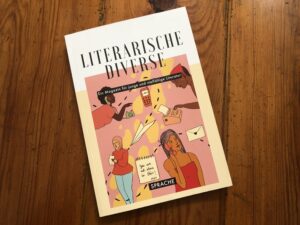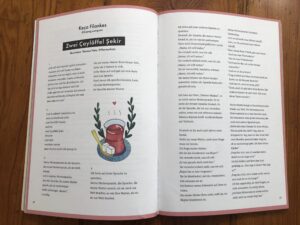Menu
One Poem, Two Translations
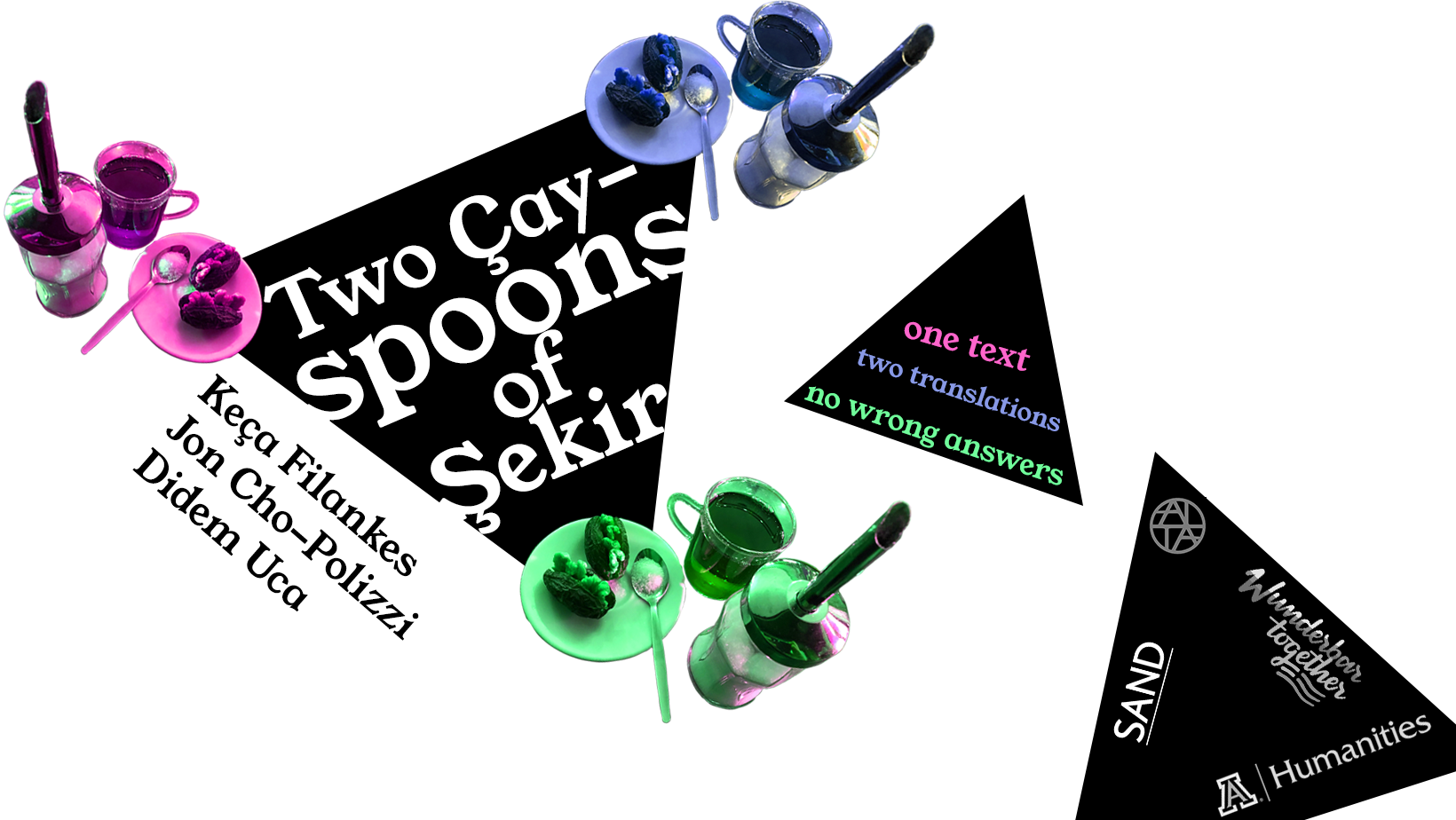
For the German-English Translation Slam on International Translation Day 2021, two translators, Jon Cho-Polizzi and Didem Uca, completed their own independent English translations of the same poem by Bîşeng Ergin, alias Keça Filankes, and discussed them live on Zoom. You can read all three versions of the text – the original German version and the two English translations – below. A replay of the event is available to watch for free on Crowdcast.
The translation slam was a collaboration between ALTA and SAND, sponsored by Wunderbar Together, and affiliated with the Tucson Humanities Festival at the University of Arizona in the US. The German poem in question originally appeared in the sold-out “Sprache” (language) issue of the journal Literarische Diverse.
Zwei
Çaylöffel
Şekir
Poetry by
Keça Filankes
1.
„isch will nich däutsch rigtich schrayben
müsssen. ich willl imma nua klayn
schrayben und one regeln wayl ia mich
trotsdem veaschdet. mayne schbrache
gehöat mia. isch bin di schbrache. ich
bin nicht weniga däutsch wayl ich
andas spreche unt schraybe. Ich binn di
deutsche schbrache. Si begind mit mia
unt endet mit mia“
2.
Lost in cultural translation ist,
wenn im Backbuch steht
zwei Teelöffel Zucker
und ich
zwei Çaylöffel Şekir
benutze
und mich
wundere, warum
mein Kuchen nicht süß genug ist.
3.
Meine Muttersprache ist die Sprache,
die meine Mutter sprach, als sie mich
bekam
und in meiner Muttersprache,
also der Sprache, die meine Mutter
sprach, als sie mich bekam
heißt schwanger „ducani“:
2-seelig.
Als mir meine Mutter ihren Körper lieh,
hatte sie 2 Herzen in sich,
teilte diese auf und gab mir eine Seele
und eine Sprache.
Noch bevor ich sprechen konnte, hatte
ich eine Muttersprache:
die Sprache meiner Mutter.
4.
Ich lerne auf einer Sprache zu
sprechen.
Meine Muttersprache, die Sprache, die
meine Mutter sprach, als sie mich zur
Welt brachte, so wie ihre Mutter, also sie
sie zur Welt brachte
Ich lerne auf einer anderen Sprache zu
sprechen.
Deutsch, die Sprache, die meiner Mutter
fremd ist, als ich von ihr und meinem
Vater nach Deutschland geflüchtet wurde.
„Mama, ich will malen.“
Sie versteht nicht, was ich will.
„Mama, ich will malen.“
Sie versteht einfach nicht, was ich will.
„Mama, ich will malen.“
Sie ist verzweifelt, machtlos, wütend.
„Mama, ich will malen.“
Als meine Mutter mit ihren Händen
antwortet, weine ich. Sprache kann sehr
gewaltvoll sein.
Ich höre das Wort „Yabancı düşman“, es
ist nicht meine Muttersprache. Es ist
nicht die fremde Sprache Deutsch. Es
ist die Sprache, die wir nur verstehen
wollen, wenn wir uns schützen müssen.
Yabancı düşman heißt Ausländerfeinde
auf Türkisch.
Deutsch ist ihr auch nach Jahren noch
fremd.
Nicht nur neue Wörter, auch neue Dinge
muss sie lernen.
Ich frage meine Mutter:
„Wo ist das Geodreieck von Büşra?“
Sie versteht nicht, was ich will.
„Es war gerade doch noch hier.“
Sie versteht einfach nicht, was ich will.
„Büşra hat es hier vergessen.“
Sie ist überfordert, nervös, verunsichert.
Alle schauen sie an.
Ich fordere meine Schwester auf, ihres zu
holen.
Als meine Mutter ihres sieht, weiß sie, wo
Büşra’s Geodreieck ist.
Meine Muttersprache ist unsere
Verbindung,
dort wo Deutsch neue Wörter schafft.
Dort, wo Deutschland neue Wörter schafft.
„Hier, nimm diese 5 Mark, geh zum Kiosk.
Kauf mir eine Telefonkarte.“
Was ist eine Telefonkarte?
„Ich brauche die, um in die Heimat
anzurufen.“
Und wo ist diese Karte?
„Frag einfach den Mann im Kiosk nach der
Karte, wo die Banane drauf ist.“
Und was ist, wenn es keine gibt?
„Doch, doch. Es gibt dort diese Karten. Die
Anderen kaufen sie auch dort. Ich muss
deine Tante anrufen.“
Meine Mutter bringt in Deutschland mehr
Kinder zur Welt. Sie bekommen eine
Muttersprache in einem fremden Land.
Sie bekommen eine große Schwester, die
noch eine andere Sprache kann.
„Mach mir einen Termin für diese Woche.
Warum geht das nicht? Sag, dass es
dringend ist. Sag, dass ich das letzte Mal
zwei Stunden gewartet habe. Frag sie,
ob es nachmittags geht. Ich habe kleine
Kinder.”
„Frag den Arzt, was ich machen kann,
damit es ein Junge wird.“
Ich bin höflich und höre dem Arzt
geduldig zu. „Was sagt er denn? Was sagt
er?“
„Frag den Arzt, ob er schon weiß, was es
sein wird. Ist es ein Junge?”
Ich bin ungeduldig. So viele Fragen, so
viele Antworten. So wenig Worte.
„Ich habe Schmerzen da unten und es
juckt mich so, woran liegt das.“
Ich schäme mich. Ich habe Angst.
Ich lüge.
„Frag ihn, ob er sicher ist, dass es ein
Mädchen ist.“
Ich bin genervt. Ich lasse Wörter weg.
„Ist alles normal beim Baby? Warum
hustet deine kleine Schwester so?”
Ich will, dass sie aufhört, mich zu
unterbrechen.
Ich will, dass sie aufhört, weiter Fragen
zu stellen.
Ich besuche meine Eltern, als ich schon
studiere.
Ich skype mit einer Freundin in Peru und
trinke aus einer Flasche.
„Warum trinkst du denn Pepsi light?“
Ich schmunzele. Meine Mutter
verwechselt sowas oft.
Pepsi light. Eistee ohne Zucker. Wurst mit
Schweinefleisch.
Sie kann nicht lesen, antworte ich.
Mit jedem Kind ein kurz anhaltender Elan,
lesen zu lernen.
Aber auf welcher Sprache denn?
Ich kann jetzt auf 5 Sprachen schreiben
Meine Mutter kann es auf keiner
Sie ist Analphabetin
Ich bin 23 Jahre alt und große Schwester
Meine Mutter ist wieder schwanger
Sie hat mit mir 6 Töchter, das 7. Kind wird
ein Sohn werden.
Ich studiere an der Uni und lese sehr
komplizierte Text, auch auf Englisch
Meine Mutter kann nicht lesen, unsere
Namen kann sie, alle Telefonnummern
weiß sie auswendig.
Sie ist Hausfrau, war das immer, und
Mutter. Sie gab mir meine erste Sprache.
Two
Çayspoons
of Şekir
Translated by
Didem Uca
1.
“i don wanna hafta rite jerman
korrektly. i jus wannna all wayz rite
lowrkase an withowt roolz cuz u
understan mee n e way. my langwij
belongz too me. i am tha langwij. i am
no les jerman becuz i
speek an rite difrently. I amm tha
german langwij. It beginz wit mee
an endz wit mee.”
2.
Lost in cultural translation is
when the baking book says
two teaspoons of sugar
and I
use
two çayspoons of şekir
and then
wonder why
my cake is not sweet enough.
3.
My mother tongue is the language
my mother spoke when she
had me
and in my mother tongue,
that is, the language my mother
spoke when she had me,
pregnant is called “ducani”:
2-souled.
When my mother lent me her body,
she had 2 hearts inside,
split them apart and gave me a soul
and a language.
Even before I could speak, I had
a mother tongue:
the language of my mother.
4.
I learn to speak in one
language.
My mother tongue, the language
my mother spoke when she brought me
into this world, just as her mother when she
brought her into this world.
I learn to speak in another
language.
German, the language that is foreign to
my mother, when I was taken by her and my
father to Germany to seek refuge.
“Mama, I want to paint.”
She does not understand what I want.
“Mama, I want to paint.”
She simply does not understand what I want.
“Mama, I want to paint.”
She is desperate, powerless, irate.
“Mama, I want to paint.”
When my mother answers with
her hands, I cry. Language can be so
full of violence.
I hear the word “Yabancı düşman,” it
is not my mother tongue. It is
not the foreign language German. It
is the language that we are only supposed
to understand when we must protect ourselves.
Yabancı düşman means xenophobes
in Turkish.
Even after many years German is still
foreign to her.
Not just new words, she also has to learn
new things.
I ask my mother:
“Where is Büşra’s triangle ruler?”
She does not understand what I want.
“It was here just a second ago.”
She simply does not understand what I want.
“Büşra forgot it here.”
She is overwhelmed, anxious, bewildered.
Everyone is looking at her.
I ask my sister to go fetch
hers.
When my mother sees it, she knows where
Büşra’s triangle ruler is.
My mother tongue is our
connection,
there where German creates new words.
There, where Germany creates
new words.
“Here, take this 5 Mark bill, go to the kiosk.
Buy me a phone card.”
What’s a phone card?
“I need one in order to call
home.”
And where is this card?
“Just ask the man in the kiosk for the
card with the banana on it.”
And what if there aren’t any?
“They’re there. The cards will be there. That’s
where the others buy them. I have to
call your aunt.”
My mother brings more children into the world
in Germany. They are given a
mother tongue in a foreign land.
They are given a big sister who
can speak another language still.
“Make me an appointment for this week.
Why won’t that work? Say that it’s
urgent. Say that last time I
waited two hours. Ask them
if afternoons work. I have small
children.”
“Ask the doctor what I can do
so that it’s a boy.”
I am polite and listen to the doctor
patiently. “What is he saying now? What’s
he saying?”
“Ask the doctor if he already knows what it’s
going to be. Is it a boy?”
I am impatient. So many questions, so
many answers. So few words.
“I have pain down there and it
itches so much, why is that.”
I feel shame. I feel fear.
I lie.
“Ask him if he’s sure that it’s
a girl.”
I’m annoyed. I leave out words.
“Is everything with the baby normal? Why
is your sister coughing like that?”
I want her to quit
interrupting me.
I want her to quit carrying on
asking questions.
I visit my parents when I am already
in college.
I skype with a friend in Peru and
take a sip from a bottle.
“Why are you drinking Diet Pepsi?”
I smirk. My mother
often gets stuff like this mixed up.
Diet Pepsi. Sugar-free iced tea. Pork
sausage.
She can’t read, I respond.
With each child, a short-lived vigor
to learn how to read.
But in which language?
I can now write in 5 languages
My mother can in none
She is an illiterate
I am 23 years old and big sister
My mother is pregnant again
Including me she has 6 daughters, the 7th child will
be a son
I study at the university and read very
complicated texts, in English, too
My mother doesn’t know how to read, our
names, all the phone numbers
she knows by heart.
She is a housewife, always was, and
mother. She gave me my first language.
Two
Çayspoons
of Şekir
Translated by
Jon Cho-Polizzi
1.
“ay down wannna half too rayt propper
Jermen. i wannna all-waze jus rayt
smol en weef-owt rules bee-cuz yew kann unter-stan
mee en-ee-waze. may speach
bee-longs too mee. i yam da lang-wich. I
yam nott les Jermen bee-cuz i speek
en rayt di-friendly. I yam da
Jermen lang-wich. She bee-gens en
ands wiff mee.”
2.
Lost in cultural translation is
when the recipe says
two teaspoons of sugar
and i
use
two ҁayspoons of şekir
and then
wonder why
my cake’s not sweet enough.
3.
my mother tongue is the tongue
my mother spoke when she had
me
and in my mother tongue
that is the tongue my mother
spoke when she had me
“ducani” means pregnant:
with 2 souls.
When my mother lent me her body
she had 2 hearts inside of her
she divided these and gave me one spirit
and one tongue.
Before I could ever speak, I
had a mother tongue:
the tongue of my mother.
4.
I learn to speak a
language.
My mother tongue, the tongue my
mother spoke when she brought me into
the world, like her mother when she
brought her.
I learn to speak another
language.
German, a language foreign to
my mother when I had to flee with her and my
father to Germany.
“Mama, I want to draw.”
She doesn’t understand what I want.
“Mama, I want to draw.”
She just doesn’t understand what I want.
“Mama, I want to draw.”
She is desperate, powerless, enraged.
“Mama, I want to draw.”
When my mother answers with her
hands, I cry. Language can be
so violent.
I hear the word “Yabancı düşman,” it’s
not my mother tongue. It’s
not this foreign German language. It
is the language we should only
understand when we need to protect ourselves.
In Turkish, yabancı düşman means
xenophobes.
Even after years, German remains foreign
to her.
It’s not just new words, but also new things
she needs to learn.
I ask my mother:
“Where is Büşra’s triangle ruler?”
She doesn’t understand what I want.
“It was just here.”
She just doesn’t understand what I want.
“Büşra left it here.”
She’s overwhelmed, nervous, insecure.
Everyone stares at her.
I tell my sister to go get
hers.
When my mother sees it, she knows where
Büşra’s triangle ruler is.
My mother tongue is our
connection,
there where German makes new words.
There, where Germany makes new
words.
“Here, take these 5 marks and go to the kiosk.
Buy me a calling card.”
What is a calling card?
“I need it to call back
home.”
And where is this card?
“Just ask the man at the kiosk for the
card, the one with the banana on it.”
And what if they don’t have one?
“They will. They have these cards there. The
others buy them there, too. I need
to call your aunt.”
My mother brings more children into
the world in Germany. They receive a
mother tongue in a foreign land.
They get a big sister who
speaks another language, too.
“Make me an appointment for this week.
Why won’t that work? Say that
it’s urgent. Say last time I waited
for two hours. Ask them
if afternoons work. I have small
children.”
“Ask the doctor what to do so that
it will be a boy.”
I’m polite and listen to the doctor
patiently. “What did he just say? What did he
say?”
“Ask the doctor if he already knows what
it will be. Is it a boy?”
I am impatient. So many questions, so
many answers. So few words.
“It hurts down there and it
really itches, why is that?”
I am ashamed. I am afraid.
I lie.
“Ask him if he’s sure that
it’s a girl.”
I am annoyed. I leave out words.
“Is everything okay with the baby? Why
does your little sister always cough?”
I want her to stop
interrupting me.
I want her to stop asking
further questions.
I visit my parents while studying
at university.
I skype with a friend in Peru and
drink from a bottle.
“Why are you drinking Diet Pepsi?”
I smirk. My mother
often mixes up these things.
Diet Pepsi. Sugar-free iced tea. Sausage made from
pork.
I tell her she can’t read.
With every child, a little push
to learn to read.
But which language should it be?
I can now write in 5 languages
My mother can write none
She is illiterate
I’m 23 years old and a big sister
My mother is pregnant again
Including me she has 6 daughters, the 7th child will be
a son.
I’m studying at university and reading very
complex texts, in English, too
My mother cannot read, she knows
our name, she’s memorized the phone numbers
by heart.
She is a housewife, always was, and a
Mother. She gave me my first tongue.
Poet & Translators
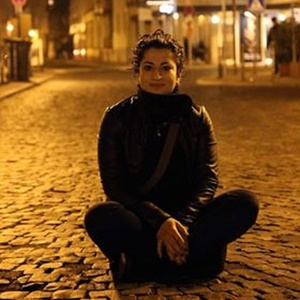
Bîşeng Ergin alias Keça Filankes (poet) holds degrees in International Relations/Peace and Conflict Studies, Sociology, and Political Science from Goethe University Frankfurt. Her parents fled from Turkey when she was a baby, and today as a Kurdish woman, political educator, and social justice activist, she dedicates her political life to fighting against discrimination, fascism, and war in solidarity with refugees and migrants. She writes poems and performs spoken word as part of Literally Peace, a transcultural German and Syrian collective.
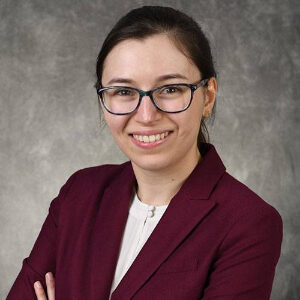
Didem Uca (translator) is Assistant Professor of German Studies at Emory University. Her research focuses on post/migrant cultural production, with recent and forthcoming articles and translations in Seminar, TRANSIT, Monatshefte, and Die Unterrichtspraxis. She is co-editor of Jahrbuch Türkisch-Deutsche Studien and serves in leadership roles in WiG, DDGC, and the MLA.
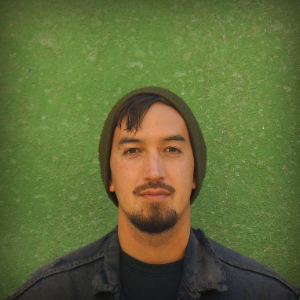
Jon Cho-Polizzi (translator) is an educator and freelance literary translator. He studied Literature, History, and Translation Studies in Santa Cruz and Heidelberg, before receiving his PhD in German and Medieval Studies at UC Berkeley with a dissertation titled “A Different (German) Village: Writing Place through Migration.” He lives and works between Northern California and Berlin.
Original Publication
Keça Filankes’s poem was originally published in German under the title “Zwei Çaylöffel Şekir” in the “Sprache” (Language) issue of the journal Literarische Diverse.
Founded by Yasemin Altınay (she/her) in 2019, Literarische Diverse Verlag publishes magazines and books that promote equity in literature and defend the tradition of self-empowerment. The project puts Germany’s colorful realities on paper – forever legible, forever part of the whole – and gives preference to BIPoC and LGBTIQ* voices.
Organizers, Sponsors, and Affiliated Festival

Initiator, co-curator, and co-organizer as part ALTA44

Co-curator and co-organizer

Sponsor

Tucson Humanities Festival of the University of Arizona

